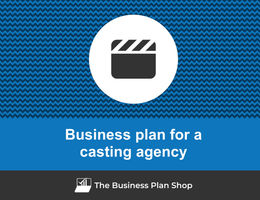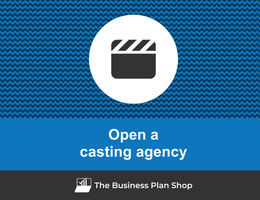How to create a financial forecast for a casting agency?
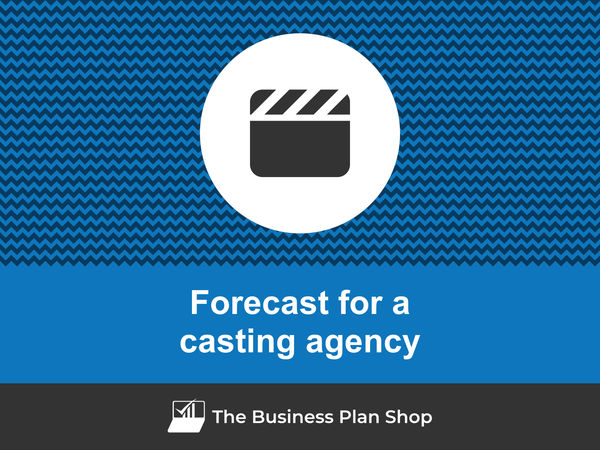
Developing and maintaining an up-to-date financial forecast for your casting agency is key in order to maintain visibility on your business’s future cash flows.
If you feel overwhelmed at the thought of putting together a casting agency financial forecast then don’t worry as this guide is here to help you.
We'll cover everything from: the main objectives of a financial forecast, the data you need to gather before starting, to the tables that compose it, and the tools that will help you create and maintain your forecast efficiently.
Let's get started!
Why create and maintain a financial forecast for a casting agency?
Creating and maintaining an up-to-date financial forecast is the only way to steer the development of your casting agency and ensure that it can be financially viable in the years to come.
A financial plan for a casting agency enables you to look at your business in detail - from income to operating costs and investments - to evaluate its expected profitability and future cash flows.
This gives you the visibility needed to plan future investments and expansion with confidence.
And, when your trading environment gets tougher, having an up to date casting agency forecast enables you to detect potential upcoming financing shortfalls in advance, enabling you to make adjustments or secure financing before you run out of cash.
It’s also important to remember that your casting agency's financial forecast will be essential when looking for financing. You can be 100% certain that banks and investors will ask to see your numbers, so make sure they’re set out accurately and attractively.
Need a convincing business plan?
The Business Plan Shop makes it easy to create a financial forecast to assess the potential profitability of your projects, and write a business plan that’ll wow investors.

What information is used as input to build a casting agency financial forecast?
A casting agency's financial forecast needs to be built on the right foundation: your assumptions.
The data required to create your assumptions will depend on whether you are a new or existing casting agency.
If you are creating (or updating) the forecast of an existing casting agency, then your main inputs will be historical accounting data and operating metrics, and your team’s view on what to expect for the next three to five years.
If you are building financial projections for a new casting agency startup, you will need to rely on market research to form your go-to-market strategy and derive your sales forecast.
For a new venture, you will also need an itemised list of resources needed for the casting agency to operate, along with a list of equipment required to launch the venture (more on that below).
Now that you understand what is needed, let’s have a look at what elements will make up your casting agency's financial forecast.
The sales forecast for a casting agency
The sales forecast, also called topline projection, is normally where you will start when building your casting agency financial forecast.
Creating a coherent sales projection boils down to estimating two key drivers:
- The average price
- The number of monthly transactions
To do this, you will need to rely on historical data (for an existing business), market research data (for both new and existing casting agencies), and consider the elements below:
- Trends in the entertainment industry: As a casting agency, your average price and number of monthly transactions may be affected by the current trends in the entertainment industry. For example, if there is a high demand for a certain type of actor or actress, you may be able to charge a higher price for their services and see an increase in transactions.
- Competition from other casting agencies: Your average price and number of monthly transactions can also be impacted by the level of competition in the market. If there are many other casting agencies offering similar services, you may need to adjust your prices to stay competitive and attract clients. This could also affect the volume of transactions as clients may choose to work with a cheaper agency.
- Changes in technology: The advancements in technology can also affect your business's average price and number of monthly transactions. For example, if virtual auditions become more popular, your agency may need to invest in new equipment and software, which could impact your prices. Additionally, the use of online platforms for casting may also change the volume of transactions.
- Demographic shifts: Changes in the demographics of your target market can also have an impact on your agency's average price and number of monthly transactions. For instance, if there is a shift towards younger actors or a growing demand for diversity in casting, you may need to adjust your prices and services accordingly.
- Economic conditions: The state of the economy can also play a role in your agency's sales forecast. During times of economic downturn, clients may have less disposable income to spend on casting services, leading to a decrease in both average price and number of monthly transactions. On the other hand, during periods of economic growth, clients may be more willing to spend on casting, resulting in an increase in both categories.
After the sales forecast comes the operating expenses budget, which we will now look into in more detail.
Need a convincing business plan?
The Business Plan Shop makes it easy to create a financial forecast to assess the potential profitability of your projects, and write a business plan that’ll wow investors.

The operating expenses for a casting agency
The next step is to estimate the costs you’ll have to incur to operate your casting agency.
These will vary based on where your business is located, and its overall size (level of sales, personnel, etc.).
But your casting agency's operating expenses should normally include the following items:
- Staff Costs: This includes salaries, benefits, and taxes for all employees working for the casting agency.
- Accountancy Fees: You will need to hire an accountant to manage your financial records, prepare taxes, and provide financial advice.
- Insurance Costs: As a casting agency, you will need to have insurance to cover any potential liability claims or accidents on set.
- Software Licenses: You will need to purchase software licenses for programs such as casting databases, scheduling software, and video editing software.
- Banking Fees: You will incur fees for maintaining a business bank account, processing transactions, and potentially for international payments.
- Rent: If you have a physical office space, you will need to pay rent for the space.
- Marketing and Advertising: You will need to budget for marketing and advertising expenses to promote your casting agency and attract clients and talent.
- Travel Expenses: You may need to travel for auditions, meetings, or to scout locations, so budget for transportation, lodging, and meals.
- Office Supplies: This includes items such as paper, printer ink, and other supplies needed to run the day-to-day operations of your casting agency.
- Professional Memberships and Subscriptions: You may need to pay for memberships to industry organizations or subscriptions to casting platforms to access a larger pool of talent.
- Legal Fees: You may need to seek legal advice for contracts, copyright issues, or other legal matters related to running a casting agency.
- Utilities: If you have a physical office space, you will need to pay for utilities such as electricity, water, and internet.
- Equipment Rental: You may need to rent equipment such as cameras, lighting, or sound equipment for auditions or productions.
- Training and Development: You may need to invest in training and development for your employees to improve their skills and stay updated on industry trends.
- Office Maintenance: You may need to budget for office maintenance and repairs, such as cleaning services or office equipment repairs.
This list is not exhaustive by any means, and will need to be tailored to your casting agency's specific circumstances.
What investments are needed to start or grow a casting agency?
Creating and expanding a casting agency also requires investments which you need to factor into your financial forecast.
Capital expenditures and initial working capital items for a casting agency could include elements such as:
- Studio Equipment: This includes items such as cameras, lighting equipment, sound equipment, and green screens. These are essential for creating high-quality productions and are considered fixed assets as they have a useful life of more than one year.
- Office Furniture: This includes desks, chairs, and other furniture needed for the office space. As a casting agency, you will need a designated office space to conduct auditions, hold meetings, and manage administrative tasks. Investing in quality office furniture will create a professional and comfortable environment for your team and clients.
- Casting Software: This includes online platforms or software programs specifically designed for casting agencies. These tools help streamline the casting process, manage talent databases, and track auditions. Investing in the right casting software can increase efficiency and improve the overall quality of your services.
- Computer Systems: This includes desktops, laptops, and other computer hardware needed to run your casting agency. You will need reliable and up-to-date computer systems to handle tasks such as video editing, communication, and data management. These are considered fixed assets as they have a longer useful life and are essential for the day-to-day operations of your agency.
- Studio Space: If you plan on having your own studio space for auditions and productions, this will be a major capital expenditure. The cost will depend on the location and size of the studio, but it is a necessary investment for a casting agency looking to provide a professional and dedicated space for clients and talent.
Again, this list is not exhaustive and will need to be adjusted according to the circumstances of your casting agency.
Need a convincing business plan?
The Business Plan Shop makes it easy to create a financial forecast to assess the potential profitability of your projects, and write a business plan that’ll wow investors.

The financing plan of your casting agency
The next step in the creation of your financial forecast for your casting agency is to think about how you might finance your business.
You will have to assess how much capital will come from shareholders (equity) and how much can be secured through banks.
Bank loans will have to be modelled so that you can separate the interest expenses from the repayments of principal, and include all this data in your forecast.
Issuing share capital and obtaining a bank loan are two of the most common ways that entrepreneurs finance their businesses.
What tables compose the financial plan for a casting agency?
Now let's have a look at the main output tables of your casting agency's financial forecast.
The profit & loss forecast
The forecasted profit & loss statement will enable you to visualise your casting agency's expected growth and profitability over the next three to five years.
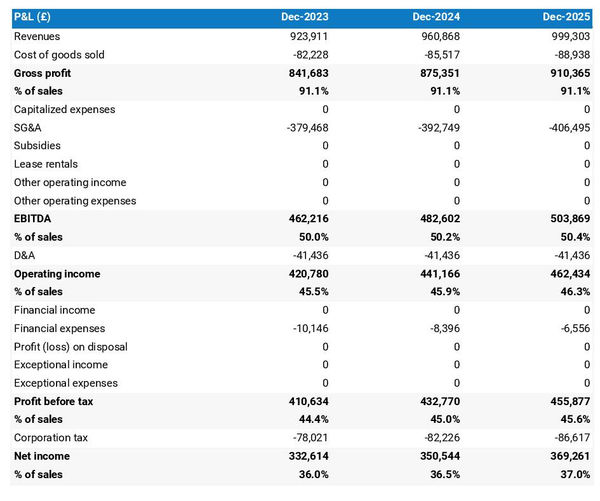
A financially viable P&L statement for a casting agency should normally show:
- Sales growing above inflation
- Stable or expanding (ideally) profit margins
- A net profit
This will of course depend on the stage of your business: a new venture might be loss-making until it reaches its breakeven point in year 2 or 3, for example.
The projected balance sheet
Your casting agency's projected balance sheet provides a snapshot of your business’s financial position at year-end.
It is composed of three types of elements: assets, liabilities and equity:
- Assets: represent what the business possesses including cash, equipment, and accounts receivable (money owed by clients).
- Liabilities: represent funds advanced to the business by lenders and other creditors. They include accounts payable (money owed to suppliers), taxes payable and loans from banks and financial institutions.
- Equity: is the combination of what has been invested by the business owners and the cumulative profits and losses generated by the business to date (which are called retained earnings). Equity is a proxy for the value of the owner's stake in the business.
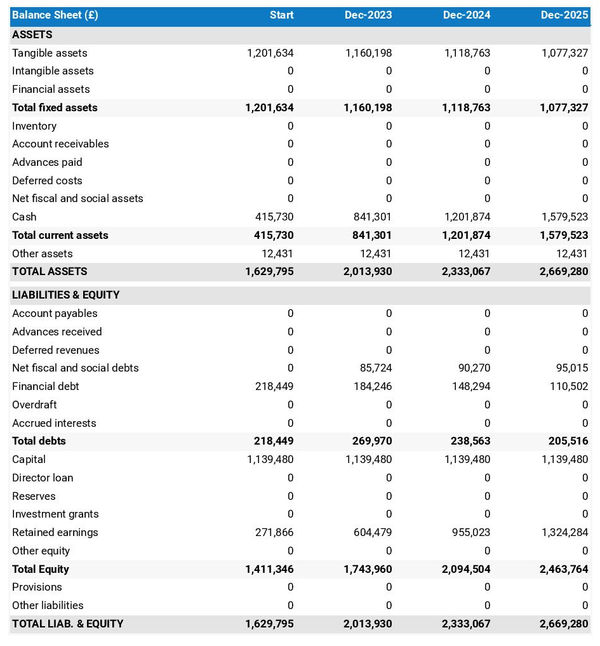
The cash flow projection
The cash flow forecast of your casting agency will show how much cash the business is expected to generate or consume over the next three to five years.

There are multiple ways of presenting a cash flow forecast but from experience, it is better to organise it by nature in order to clearly show these elements:
- Operating cash flow: how much cash is generated by the casting agency's operations
- Investing cash flow: what is the business investing to expand or maintain its equipment
- Financing cash flow: is the business raising additional funds or repaying financiers (debt repayment, dividends)
Your cash flow forecast is the most important element of your overall financial projection and that’s where you should focus your attention to ensure that your casting agency is adequately funded.
Note: if you are preparing a financial forecast in order to try to secure funding, you will need to include both a yearly and monthly cash flow forecast in your casting agency's financial plan.
Need a convincing business plan?
The Business Plan Shop makes it easy to create a financial forecast to assess the potential profitability of your projects, and write a business plan that’ll wow investors.

Which tool should you use to create your casting agency's financial forecast?
Using the right tool or solution will make the creation of your casting agency's financial forecast much easier than it sounds. Let’s explore the main options.
Using online financial projection software to build your casting agency's forecast
The modern and easiest way to build a forecast is to use professional financial projection software such as the one we offer at The Business Plan Shop.
There are several advantages to using specialised software:
- You can easily create your financial forecast by letting the software take care of the financial calculations for you without errors
- You have access to complete financial forecast templates
- You get a complete financial forecast ready to be sent to your bank or investors
- You can easily track your actual financial performance against your financial forecast, and recalibrate your forecast as the year goes by
- You can create scenarios to stress test your forecast's main assumptions
- You can easily update your forecast as time goes by to maintain visibility on future cash flows
- You have a friendly support team on standby to assist you when you are stuck
- It’s cost-efficient and much cheaper than using an accountant or consultant (see below)
If you are interested in this type of solution, you can try our forecasting software for free by signing up here.
Hiring a financial consultant or chartered accountant
Hiring a consultant or chartered accountant is also an efficient way to get a professional casting agency financial projection.
As you can imagine, this solution is much more expensive than using software. From experience, the creation of a simple financial forecast over three years (including a balance sheet, income statement, and cash flow statement) is likely to start around £700 or $1,000 excluding taxes.
The indicative estimate above, is for a small business, and a forecast done as a one-off. Using a financial consultant or accountant to track your actuals vs. forecast and to keep your financial forecast up to date on a monthly or quarterly basis will naturally cost a lot more.
If you choose this solution, make sure your service provider has first-hand experience in your industry, so that they may challenge your assumptions and offer insights (as opposed to just taking your figures at face value to create the forecast’s financial statements).
Why not use a spreadsheet such as Excel or Google Sheets to build your casting agency's financial forecast?
Creating an accurate and error-free casting agency financial forecast with a spreadsheet is very technical and requires a deep knowledge of accounting and an understanding of financial modelling.
Very few business owners are financially savvy enough to be able to build a forecast themselves on Excel without making mistakes.
Lenders and investors know this, which is why forecasts created on Excel by the business owner are often frowned upon.
Having numbers one can trust is key when it comes to financial forecasting and to that end using software is much safer.
Using financial forecasting software is also faster than using a spreadsheet, and, with the rise of artificial intelligence, software is also becoming smarter at helping us analyse the numbers to make smarter decisions.
Finally, like everything with spreadsheets, tracking actuals vs. forecasts and keeping your projections up to date as the year progresses is manual, tedious, and error-prone. Whereas financial projection software like The Business Plan Shop is built for this.
Need a convincing business plan?
The Business Plan Shop makes it easy to create a financial forecast to assess the potential profitability of your projects, and write a business plan that’ll wow investors.

Use our financial projection templates for inspiration
The Business Plan Shop has dozens of financial forecasting templates available.
Our examples contain both the financial forecast, and a written business plan which presents, in detail, the company, the team, the strategy, and the medium-term objectives.
Whether you are just starting out or already have your own casting agency, looking at our template is always a good way to get ideas on how to model financial items and what to write when creating a business plan to secure funding.
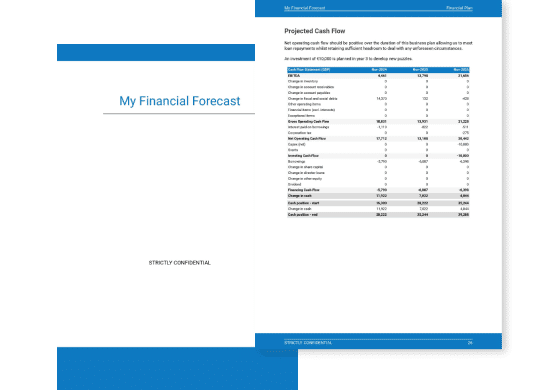
Takeaways
- Having a financial forecast enables you to visualise the expected growth, profitability, and cash generation for your business over the next three to five years.
- Tracking actuals vs. forecast and keeping your financial projections up-to-date is the only way to get a view on what your casting agency future cash flows may look like.
- Using financial forecasting software is the mordern and easy way to create and maintain your forecasts.
This is the end of our guide on how to build the financial forecast for a casting agency, we hope you found it useful. Don't hesitate to contact us if you want to share your feedback or have any questions.
Need a convincing business plan?
The Business Plan Shop makes it easy to create a financial forecast to assess the potential profitability of your projects, and write a business plan that’ll wow investors.

Also on The Business Plan Shop
- Example of financial forecast
- How to create a sales forecast for a business?
- Example of financial forecast for business idea
Know someone who owns or is thinking of starting a casting agency? Share our forecasting guide with them!


